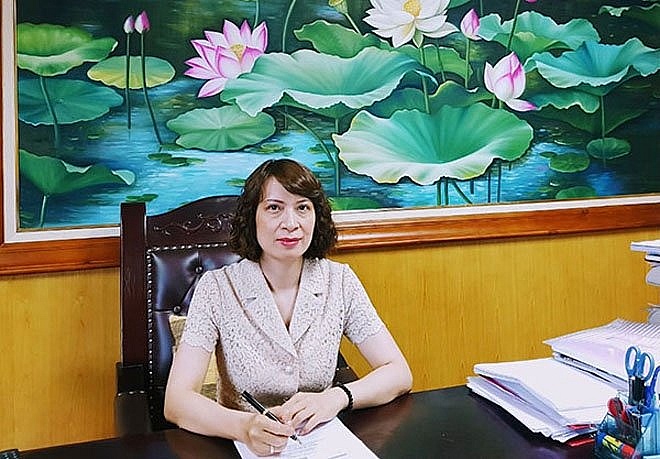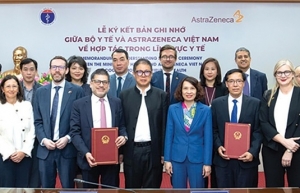INTERNATIONAL INVESTMENT
AND PORTAL
 Nguyen Thi Lien Huong, Deputy Minister of Health
Nguyen Thi Lien Huong, Deputy Minister of Health
In 2023, the health sector continued its efforts to draw domestic and foreign investment, urging units and localities to complete investment procedures and implement projects in grassroots healthcare facilities and preventive health using capital from the socioeconomic recovery and development initiative, while mobilising and taking advantage of aid from governments and non-government organisations for healthcare development.
Last year, the Ministry of Health (MoH) received approval from the National Assembly (NA) and the government to use social resources for medical examinations and treatment, which means medical examination facilities can borrow capital to invest in infrastructure and medical equipment, as well as other expenses. They can also accept sponsorship and aid from domestic and foreign organisations and individuals.
It is expected that in 2024, the MoH will issue a circular guiding a number of investment activities under the public-private partnership (PPP) model in the healthcare sector.
The amended Law on Medical Examination and Treatment and the decree guiding the law have only just been issued, so in 2023 any attempt to attract investment in the sector followed existing regulations.
However, last year, investment in drug production made progress with a series of new facilities, upgrades and expansions following EU-GMP standards, for example Medochemie Vietnam, Rohto Vietnam, Hau Giang Pharmaceutical, Danapha, Ampharco, and TV Pharm.
A number of companies continue to welcome technology transfers for the production of new drugs and original brand-name drugs from multinational pharmaceutical companies. There have been 20 original brand-name drugs transferred for production in Vietnam. In particular, the MoH has coordinated with Ho Chi Minh City and Thai Binh province to deploy two specialised pharmaceutical industrial parks. Construction of these parks will start in the second quarter of 2024.
In 2024, medical examination and treatment facilities will continue to diversify their resources based on public investment, strengthen investment promotions, approach international investment funds, and access legal capital sources with low interest rates and long grace periods, thus creating other capital mobilisation channels besides credit.
The MoH is working with the Ministry of Planning and Investment to advise the government on investment incentives for the production of drugs, vaccines, medical equipment and construction, and to propose criteria for production facilities of drugs, vaccines and medical equipment.
Improvements to institutions and policies are an issue of concern for the business community. What priorities has the healthcare sector given to making further advancements?Improving policies and institutions is an issue the MoH gives top priority to, with a focus on building and completing legal documents related to the fields of medical examination and treatment, along with health insurance, pharmacies and medical equipment.
On December 30, 2023, the government issued a decree guiding the implementation of the amended Law on Medical Examination and Treatment. The following day, the minister of health issued a circular detailing a number of regulations within the law. With a patient-centred perspective, the law and guiding documents promote and improve the quality of medical examination and treatment.
The MoH is currently asking for opinions from ministries and agencies, medical equipment associations, pharmaceutical firms and business associations about types, criteria on scale, and standards of establishments producing drugs, vaccines, and biological products that are eligible for income tax incentives.
To improve the quality of medical examination and treatment, and create better conditions for businesses, what are the key tasks for 2024?2024 will be a breakthrough year, decisive in successfully implementing the five-year socioeconomic development plan for 2021-2025. The world situation continues to look very complicated and difficult to predict. At home, besides opportunities and advantages, there are still great difficulties. The health sector is determined to successfully implement the goals and tasks set for 2024, focusing on the following key tasks.
Continuing to build and complete institutions and policies, and improve state management capacity. In the immediate future, building and deploying documents guiding the implementation of the revised Law on Medical Examination and Treatment; completing and submitting to the NA amendments to the Pharmacy Law and the Health Insurance Law; drastically and effectively implementing legislation to improve the quality of grassroots healthcare operations.
Completing and implementing a medical facility network plan; promoting administrative reform and decentralisation of power along with resource allocation; improving the capacity of enforcement officers and strengthening inspection, examination, and supervision; increasing the responsibility and roles of ministries, agencies and localities in building and implementing policies and institutions in the health sector.
Continuing to focus on effectively controlling epidemics, especially newly emerging ones; improving capacity to analyse and forecast epidemic situations; proactively developing scenarios and plans to respond effectively to epidemics; maintaining and effectively implementing the National Expanded Vaccination Programme.
Strengthening the management and treatment of non-communicable diseases, occupational diseases, accidents and injuries, and improving people's health; implementing synchronously legal regulations on food safety.
Focusing on improving the quality of medical services and people's satisfaction; actively and decisively implementing investment programmes and projects to improve the capacity of the health system, especially grassroots health projects and preventive health programmes with funding from the socioeconomic development recovery programme; strengthening the mobilisation of investment resources for the health sector.
The MoH will coordinate with relevant ministries and agencies to develop policies to enable medical facilities to access capital sources, including preferential loans from the government and commercial loans for investing in facilities and purchasing medical equipment. It will also promote public-private cooperation; creating conditions for private healthcare to develop while improving the efficiency of investment capital use, especially public investment.
Enhanced training, technology transfer, and rotation of medical staff will improve the quality of medical human resources, strengthening research and improving the efficiency of science and technology activities and innovation in the healthcare sector. New regimes for medical staff will be proposed for the overall reform of salary policy following legislation to become effective from July 1, 2024 aimed at attracting qualified human resources to work long-term in grassroots healthcare.
Continuing to solve the shortage of drugs, supplies and medical equipment at public medical facilities will also be a focus, while completing the development of a special mechanism on the supply, storage and procurement of rare drugs and drugs used for treating rare diseases.
The management, licensing and renewal of drugs and medical equipment will be monitored, and the MoH will advise the government on a legal framework, documents and policies for the procurement of drugs, equipment, supplies and medical biological products, promoting the implementation of the national strategy for developing Vietnam's pharmaceutical industry.
 FPT Long Chau and IHH Healthcare Singapore enter partnership
FPT Long Chau and IHH Healthcare Singapore enter partnership
FPT Long Chau and top private healthcare provider IHH Healthcare Singapore signed a cooperation agreement on January 29 to enhance the quality of high-tech medical treatment available in Vietnam.
 Demand fuelled for high-quality healthcare services
Demand fuelled for high-quality healthcare services
Vietnam’s healthcare market is emerging as a fertile land for foreign investors to cash in on its tremendous potential.
 AstraZeneca Vietnam dedicated to health
AstraZeneca Vietnam dedicated to health
AstraZeneca Vietnam has started the year by building on last year’s success with programmes that cater to improving livelihoods and enhancing healthcare.


















